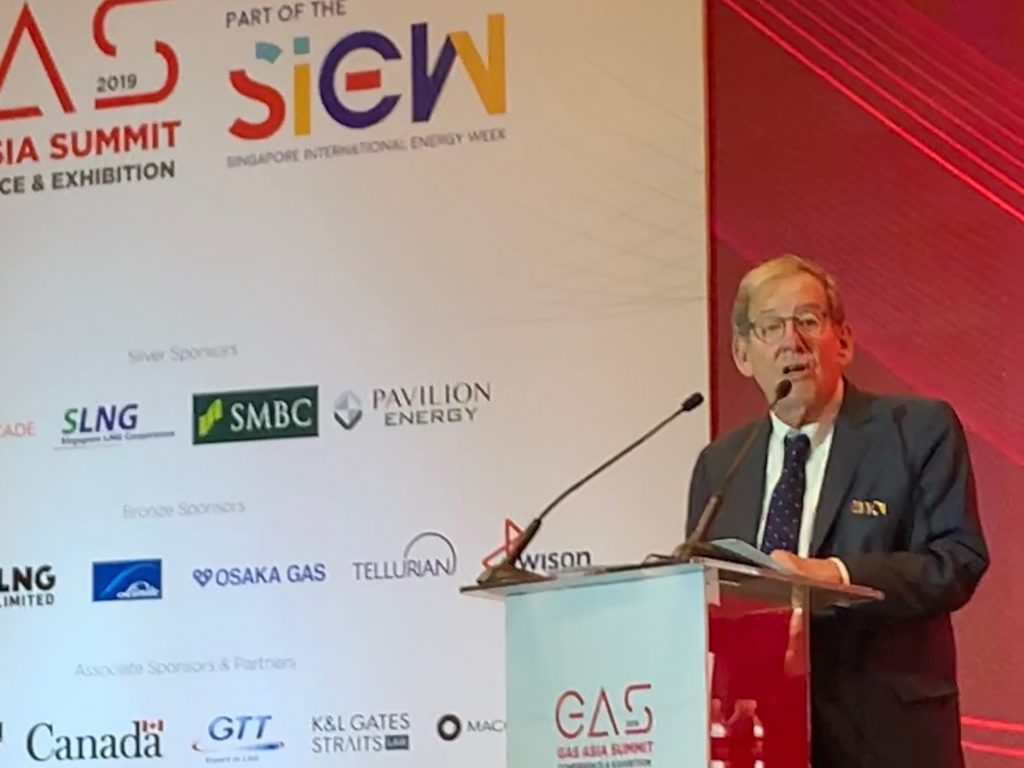The following are keynote remarks as delivered by Amb. Richard Morningstar, founding chairman of the Atlantic Council Global Energy Center, to kick off Day 2 of the 2019 Gas Asia Summit, part of Singapore International Energy Week 2019.
Your excellencies, distinguished guests, ladies, and gentlemen—good morning. It’s an honor to be here in Singapore. It’s been a fantastic two days of Singapore International Energy Week, and I’m looking forward to continuing the conversation at today’s Gas Asia Summit.
The past two decades have seen a paradigm-shift in energy security—in many ways, for the better. In a rapidly growing and electrifying world, a global energy transition has begun to create a more diverse and fungible energy mix, offering new technologies which can enhance energy security, increase energy access, and cut emissions. Singapore Minister of Trade and Industry Chan Chung Sing, in his speech on Tuesday, expertly described these technologies.
These changes have revealed several new truths which will shape our shared energy future. First, the effort to combat climate change is here to stay. Second, as we make decisions about the future of our energy mix, we must remain technology-neutral if we want to meet the dual challenge of rising energy demand and decarbonization. We must look to a whole range of technologies if we wish to succeed. And third, if we want to achieve lasting change by removing coal from that mix, natural gas must play a major role.
This is why the transformation of the natural gas market over past decade has been so important. A boom in natural gas production in the United States through unconventional shale resources, a corresponding diversification of natural gas producers (not just in the United States), and the rapid growth of liquefied natural gas (LNG) trade represents a maturation of the global gas market, which offers the opportunity to tap into a cleaner fossil fuel while the energy transition continues to gain momentum.
These changes have the potential to reshape the balance of global energy demand. If the story of the last decade in natural gas has been a production boom, the story of the next decade will be how that production can support Asia’s demand boom. The opportunities are immense—the challenges are as well.
If the story of the last decade in natural gas has been a production boom, the story of the next decade will be how that production can support Asia’s demand boom. The opportunities are immense—the challenges are as well.
The opportunities and challenges for natural gas in Asia are two sides of the same coin. The opportunity is one of economic and climate leadership: sustaining economic growth and ensuring a sustainable, low emissions environment for years to come. The challenge is competing with and economically replacing coal.
Across Asia, legacy coal infrastructure and coal consumption has, until now, been essential to increase energy access for growing populations that demand more and more power. India relies upon coal for about half of its primary energy consumption, while China, Indonesia, and the Philippines, among others, have continued or increased their use of cheap coal to meet rising energy demand.
Yet that picture is changing. Coal use may continue, but a maturing supply picture has made LNG increasingly cost-competitive and will play a key role in continued growth on the continent, especially as countries prioritize emissions-savings and sustainability. Here, natural gas not only presents a cleaner alternative to coal, but will also be a necessary complement to renewables across Asia, which are projected to account for 35 percent of power capacity in Southeast Asia by 2040.
With this in mind, countries throughout the region are increasingly using policy incentives to drive LNG consumption instead of coal. China has led a push to transition from coal to natural gas in power and industrial use, leading to a 14 percent increase in their LNG demand this year alone. And here in Singapore, policy support for less carbon-intensive fuels have increased natural gas’ share of electricity generation from 19 percent to 80 percent over the past two decades.
Increase in the use of gas will have important geopolitical and energy security implications not just for Asia but for the world.
One of the most important implications is one I have already touched on: enhanced energy diversity—giving importing countries more leverage in meeting their energy needs. A diverse LNG supply chain will also help to disaggregate energy supply risks from geopolitical chokepoints like the Straits of Hormuz, but increased LNG demand will, on the other hand, also drive new international trade patterns and possible disputes as upstream supply lines adapt to new demand patterns.
That leads me to another potential implication: gas demand does provide a cleaner alternative to coal as the region electrifies, but major infrastructure investments are still necessary to ensure that increased energy access does not continue to be supported with cheap coal. Cooperation between producers and consumers will be essential to build out offtake capacity, distribution, delivery routes, and new terminals and hubs across the region. Public and private partnerships between importing governments and the supplying multi-national corporations and countries will be critical in ensuring these projects are financially feasible and are completed quickly, further helping natural gas to compete with coal power. Together, interconnections and partnerships will be critical to solidifying the positive gains made so far in the energy transition.
As these partnerships grow, there are indeed risks that come from interdependence. Protectionism, distrust, and the use of energy as a political tool can be a strain on the entire value chain from production to infrastructure deployment, limiting gas’ ability to support economic, sustainability, and energy security goals that we all share
But the incentives for cooperation should outweigh these risks.
Let me make one other important point. I strongly—very strongly—disagree with those who oppose new natural gas infrastructure for fear that it will slow down the transition to renewables and other technologies. Gas is going to be critical for the foreseeable future.
The energy transformation in Asia is already rapidly accelerating. That rapid energy growth has come with consequences. Coal pollution has crippled cities like Beijing and Delhi, and there have been growing pains in constructing grids to meet burgeoning populations. Meanwhile, the global imperative to decarbonize has placed this region at a moment of historical significance—one in which it is now positioned to lead the fight against climate change. Great strides have been made in beginning to switch to renewable technologies and natural gas—strides that have enhanced the energy security of the region. But more can and must be done. Environmental concerns persist—and will get worse if we do not act quickly to meet growing demand with cleaner energy sources.
Natural gas will be essential in that effort. The future of gas is here, now.
And with that I look forward to continuing our conversations today.
Richard L. Morningstar is founding chairman of the Atlantic Global Energy Center.
Image: Amb. Richard L. Morningstar gives keynote remarks to kick off Day 2 of the 2019 Gas Asia Summit, part of Singapore International Energy Week 2019.

